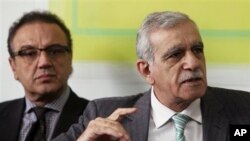ISTANBUL —
Four leading members of Turkey's main pro-Kurdish political movement on Wednesday were denied a visit with Abdullah Ocala, imprisoned leader of the Kurdistan Workers' Party (PKK) movement.
According to local news reports, the visit, part of government-led efforts to peacefully resolve the three-decades-long Kurdish insurgency, was cancelled by justice ministry officials after Kurdish leaders criticized recent Turkish air strikes against PKK bases in neighboring Iraq.
The Turkish military confirmed that its warplanes attacked numerous PKK targets across northern Iraq, following the purportedly PKK-backed killing of a Turkish police officer.
On Tuesday, Prime Minister Recap Erdogen defended the air strikes, drawing a distinction between the Kurdish people and PKK militants, whom he vowed to pursue.
"We have opened our hearts to our Kurdish brothers," he said. "We are sending bombs to terrorists; our fight against terror will continue today and tomorrow."
Political observers say Erdogan, who on Wednesday held talks with Kurdish legislators in his party, is facing growing criticism from Turkish nationalists for his peace initiative with the Kurds.
On Tuesday, parliament member Ahmet Turk, head of the pro-Kurdish Democratic Society Congress, again attacked the prime minister's stance on the Kurds as inconsistent.
"This creates mistrust among Kurdish people," he said. "The army held air strikes with 50 jet fighters while PKK showed no sign of offense."
Turk, who held talks with Ocalan earlier this month – the first such contact the rebel leader has had for more than a year – was expected to be among the political figures who intended to visit Ocalan Wednesday on the Turkish prison island of Imrali.
Analysts said ending Ocalan's isolation with visits by leaders of legal Kurdish parties was important to peace efforts and helped to build trust. It remains unclear if and when such visits will resume.
Government peace efforts were also dealt a blow this month by the assassination in Paris of three women Kurdish activists, including a founding member of the PKK.
Kurdish groups have accused rogue elements of Turkish state of being involved, a charge strongly denied by the government. Earlier this week, French investigators arrested a Kurd from Turkey, saying the motive for the murders was most likely a feud within the PKK, a claim the rebel group denies.
Still, analysts in Turkey say deep distrust between Turkish and Kurdish leaders continues to pose one of the biggest threats to fledgling peace efforts.
According to local news reports, the visit, part of government-led efforts to peacefully resolve the three-decades-long Kurdish insurgency, was cancelled by justice ministry officials after Kurdish leaders criticized recent Turkish air strikes against PKK bases in neighboring Iraq.
The Turkish military confirmed that its warplanes attacked numerous PKK targets across northern Iraq, following the purportedly PKK-backed killing of a Turkish police officer.
On Tuesday, Prime Minister Recap Erdogen defended the air strikes, drawing a distinction between the Kurdish people and PKK militants, whom he vowed to pursue.
"We have opened our hearts to our Kurdish brothers," he said. "We are sending bombs to terrorists; our fight against terror will continue today and tomorrow."
Political observers say Erdogan, who on Wednesday held talks with Kurdish legislators in his party, is facing growing criticism from Turkish nationalists for his peace initiative with the Kurds.
On Tuesday, parliament member Ahmet Turk, head of the pro-Kurdish Democratic Society Congress, again attacked the prime minister's stance on the Kurds as inconsistent.
"This creates mistrust among Kurdish people," he said. "The army held air strikes with 50 jet fighters while PKK showed no sign of offense."
Turk, who held talks with Ocalan earlier this month – the first such contact the rebel leader has had for more than a year – was expected to be among the political figures who intended to visit Ocalan Wednesday on the Turkish prison island of Imrali.
Analysts said ending Ocalan's isolation with visits by leaders of legal Kurdish parties was important to peace efforts and helped to build trust. It remains unclear if and when such visits will resume.
Government peace efforts were also dealt a blow this month by the assassination in Paris of three women Kurdish activists, including a founding member of the PKK.
Kurdish groups have accused rogue elements of Turkish state of being involved, a charge strongly denied by the government. Earlier this week, French investigators arrested a Kurd from Turkey, saying the motive for the murders was most likely a feud within the PKK, a claim the rebel group denies.
Still, analysts in Turkey say deep distrust between Turkish and Kurdish leaders continues to pose one of the biggest threats to fledgling peace efforts.












